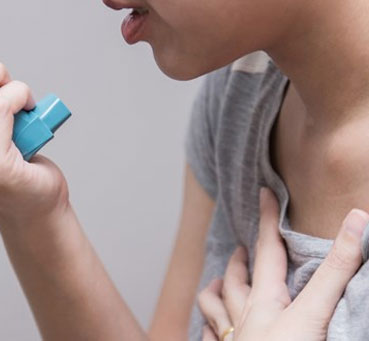What You Need To Know About Asthma
Novermber 26, 2018
Asthma is a chronic breathing problem that happens when our airways gets swelled up and do not function properly and prevents air from reaching our lungs. Asthma causes uncomfortable symptoms, but in some people, it can cause life threatening symptoms also. Asthma is an incurable disease but it can be controlled and prevented.
Asthma Triggers

A person suffering from asthma can become sensitive to certain things from surroundings that may trigger asthma attack or its symptoms. The swollen airways may react to many things, which are called ‘triggers’. During an asthma attack, the symptoms increase to a higher extent and the breathing capacity of a person gets reduced due to contraction of muscles around airways. A person may feel tight in the chest and cough a lot when his asthma gets out of control. The asthma triggers may not be same for every person but once identified, they can surely be prevented. Some of the asthma triggers include:
- Allergens (pollen, dust, mold, pets etc)
- Tobacco Smoke
- Weather Change
- Medications
- Respiratory infections
- Cleaning Products
- Exercise
- Perfume or other irritants
- Intense laughing or crying
Many people experience asthma attacks in certain places like outdoors or gym. An asthma attack induced during exercise happens more commonly during weather season while an allergy-induced asthma happens due to airborne particles like spores, pollen, mold etc. Occupational asthmatics are sensitive to dust, gases or chemical smells.
Symptoms of Asthma

Similar to triggers, the symptoms of asthma also vary from person to person. Some of the symptoms may represent a life threatening emergency. Some of the common symptoms of asthma attack are:
- Shortness of breath
- Chest pain
- Chest tightness
- Coughing
- Wheezing when exhaling
- Chronic Cough
- Troublesome sleep
When the symptoms become more bothersome or frequent, it signals that your asthma is getting worse and there is a need to use quick-relief inhaler more often.
Asthma is a serious disease, and can be life threatening if not treated properly. One can get a serious attack even with mild asthma. You need to seek an emergency medical intervention if the shortness of breath worsens and there is no relieving even after using the inhaler. The asthma patients can live normal and active lives when the disease is treated in a right way.
Diagnosis and Treatment

The doctor will review your family as well as medical history along with study of symptoms before performing any tests to diagnose asthma. The healthcare provider will listen to your lungs and heart while performing physical examination. You may also require to get sinus x-rays and blood and allergy tests done. The results of these tests will help the doctor for proper diagnosis of the problem that causes these symptoms.
For treating asthma, the first thing to do is to avoid the triggers. However, avoiding triggers may not be possible at every place. So, you should consult your healthcare professional to find the best treatment for you. You may be put on certain quick-relief medications along with some long term asthma control medications to control the symptoms. Some medicines to reduce the body’s sensitivity to allergies may also be prescribed to curb allergy-induced asthma. With proper treatment for asthma, one can stay active and live a reduced symptom or symptom free life.
RECENT BLOGS
- Post-Heart Surgery Care: Essential Tips for Faster Recovery and Better Heart Health
- Physiotherapy in Healthcare: Why It’s Essential for Post-Operative Recovery
- A Complete Guide to Ultrasonography: Procedure, Benefits, and Applicationss
- The Complete Guide to Pulmonary Function Tests: Preparing, Procedure, and Results
- Breathing Easy: Simple Habits for Better Lung Health and Wellness
- Understanding Asthma: Symptoms, Triggers, and How to Manage It Effectively
- Recognizing a Heart Attack: Early Symptoms and Immediate Steps to Take
- CT Scans: Everything You Need to Know – Procedure, Precautions, and How They Help Your Health
- Choosing the Right Hospital: What Patients Need to Know for Better Healthcare
- The Journey to Better Digestive Health: Identifying Issues with Gastroscopy
- Simple Food Habits to Boost Your Immune System and Respiratory Health
- The Importance of Regular Health Screenings for Heart Disease Prevention
- Fit for Life: The Health Benefits of Regular Exercise for Everyone
- Living with Pulmonary Hypertension: Managing Symptoms and Improving Quality of Life
- Exploring the Lifelong Benefits of Physical Activity on Heart Health
- The Role of CT Scans in Diagnosing Respiratory Conditions: What Patients Need to Know
- Unlocking the Benefits of Regular Physical Activity for Heart Health
- The Role of Diet in Asthma Management: Foods to Eat and Avoid
- The Role of CT Scans in Diagnosing Respiratory Disorders
- How to Prepare for Thoracic Surgery: A Patient’s Guide
- BreatheWell Insights: Navigating Respiratory Health with Santosham Chest Hospital
- Gastroscopy Demystified: Your Essential Guide to Digestive Health
- Thoracic back pain treatment
- Quit smoking save your lungs – how to quit smoking?
- Asthma Symptoms and Treatments You Should Know
- Best Chest Hospital in India
- Exercises for COPD patients
- What To Expect At A Pulmonary Function Test
- Types of Asthma Medications
- Tips for keeping your lungs healthy
- Santosham Hospital- the best Pulmonology Hospital in India
- Guide to Gastroscopy - Symptoms & Procedure
- COPD - Know the Signs and Symptoms & Get the Facts
- Living with Pulmonary Hypertension
- Smoking and COPD Effects
- What You Need To Know About Asthma
- Side effects of eating too much choclate
- Top 4 Ways You Can Purify Your Lungs Naturally
- Rotational shifts are disrupting your metabolism
- How to survive heart attack when you’re alone?
- Tips for a Healthy Mind, Body And Spirit
- Seven Ways to Cut the Junk Food
- How Fruits and Vegetables are important for the diet?
- 5 reasons why walk is the best workout
- 7 benefits of eating healthy and exercising regularly
- 7 Best Exercise To Keep Your Heart Healthy Forever
- 10 Good Habits for Healthy Heart
- 10 Foods to Keep your Heart Healthy

